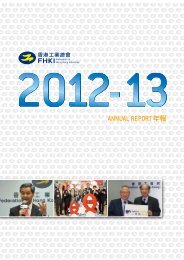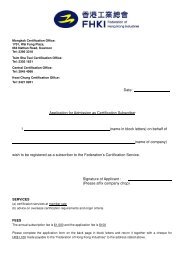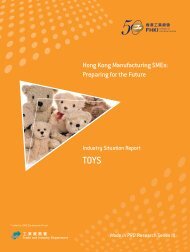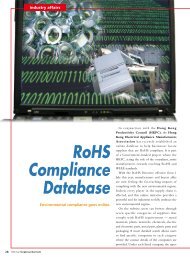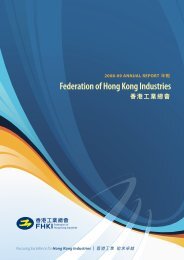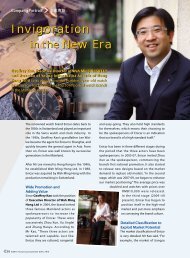Hong Kong Manufacturing SMEs: Preparing for the Future
Hong Kong Manufacturing SMEs: Preparing for the Future
Hong Kong Manufacturing SMEs: Preparing for the Future
- No tags were found...
You also want an ePaper? Increase the reach of your titles
YUMPU automatically turns print PDFs into web optimized ePapers that Google loves.
64Lessons from <strong>the</strong> Suga Holdings CaseThere are a number of lessons that can be learnedfrom <strong>the</strong> Suga case.• <strong>SMEs</strong> should focus on specialised products.These products are not as vulnerable to marketfluctuation as general products, and <strong>the</strong>y tendto have a higher profit margin than generalproducts.• By being <strong>the</strong> leading manufacturer of a nicheproduct, <strong>the</strong> SME becomes more important to<strong>the</strong> customers that have developed <strong>the</strong> endmarkets <strong>for</strong> those products. This creates barriersto entry which mean that o<strong>the</strong>r companies wouldfind it harder to compete with <strong>the</strong> firm.• <strong>SMEs</strong> that specialise in selling niche products arelikely to have fewer competitors.• The price/per<strong>for</strong>mance ratio is most important <strong>for</strong><strong>the</strong> customer because low price but low quality isnot an efficient trade-off.• <strong>SMEs</strong> need to continually innovate. Innovationis difficult but to remain successful it is essential.This means finding innovative people anddeveloping innovative ideas is important.• Striving to innovate means that <strong>the</strong>re will befailures as well as successes.• <strong>SMEs</strong> should ensure that <strong>the</strong>ir business modelmatches <strong>the</strong> business environment.• To avoid problems from an overreliance on onelarge customer, <strong>SMEs</strong> should develop a customerbase with a diverse geographical and productmix.• <strong>SMEs</strong> in this sector need to carefully considerwhe<strong>the</strong>r it is worth spending <strong>the</strong> money that isrequired to build a brand.• <strong>SMEs</strong> can leverage off <strong>the</strong>ir technologicalcapability to capture an attractive profit margin.• <strong>SMEs</strong> in <strong>the</strong> sector operate in a complexenvironment that requires technology andengineering support at a fairly high level.• Firms will need to automate operations wherepossible. This adds to <strong>the</strong> cost and complexity ofrunning <strong>the</strong> business.• China’s domestic market is fast-growing butcomparatively small and not yet very attractive.Thus any move to try and replace existingmarkets in <strong>the</strong> US, Europe, and Japan, with <strong>the</strong>market in Mainland China being premature.• Cost increases need to be covered by <strong>the</strong>business and when <strong>the</strong>y frequently occur <strong>the</strong>re isa need to pass <strong>the</strong> costs along to <strong>the</strong> customer,which is sometimes difficult.• Customers and competitors won’t wait <strong>for</strong> afirm to put its strategy in place. Firms needto constantly revisit <strong>the</strong>ir strategies and thinkthrough <strong>the</strong> various scenarios that might affect<strong>the</strong>ir business and plan on how to respond to<strong>the</strong>m.• Excellence in a specialised field or niche area maynot be enough to make <strong>the</strong> firm successful.• Spikes and troughs in demand occur and plansshould be in place to deal with <strong>the</strong>m.• <strong>Hong</strong> <strong>Kong</strong>’s regulatory system is simpler andmore transparent than China’s. Firms may needsenior staff in China who know how to deal with<strong>the</strong> system <strong>the</strong>re.• <strong>SMEs</strong> must take <strong>the</strong>ir regulatory responsibilitiesvery seriously. It is unlikely that being small in sizewill be accepted as a reason <strong>for</strong> regulatory noncompliance.• <strong>SMEs</strong> should benchmark <strong>the</strong>ir activities againstworld’s best practice.• <strong>SMEs</strong> can and should think and act like big firms.They should consider using globally recognisedprofessional services firms. They will benefit fromputting world-class management per<strong>for</strong>mancesystems in place.• <strong>SMEs</strong> don’t need a lot of start-up capital. Theycan scale capacity by leasing a portion of ano<strong>the</strong>rfactory’s production capacity. The money savedby not immediately buying a factory can be spentin marketing and developing <strong>the</strong> business.• Good financial management is important to<strong>SMEs</strong>. This includes <strong>the</strong> maintenance of strategiccash buffers, and <strong>the</strong> establishment of bankingfacilities.






